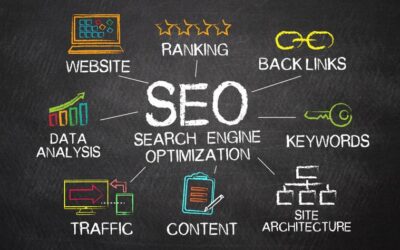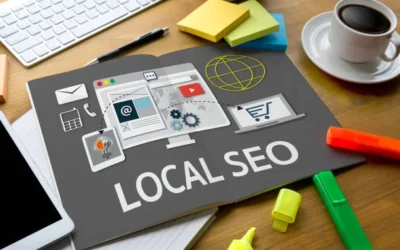How AI Is Affecting SEO for Blogging: What Content Creators Need to Know
Artificial Intelligence (AI) is no longer an experimental technology reserved for Silicon Valley. It’s embedded in search engine algorithms, content creation tools, analytics platforms, and personalization engines, and it’s transforming the blogging world faster than any previous SEO shift.
If you’ve been blogging for more than a few years, you’ve likely felt the change. Search rankings can rise or drop overnight, AI-powered competitors are publishing content at lightning speed, and readers expect faster, more relevant, and more personalized content experiences.
Understanding how AI is affecting SEO for blogging is not just a marketing skill; it’s survival knowledge for anyone who depends on organic search traffic.
This guide will walk you through:
- How AI is influencing every stage of SEO strategy
- Practical, actionable steps to future-proof your blog
- Common questions bloggers ask about AI-driven search
- Predictions for what’s coming next
Table of Contents:
- The AI Revolution in Blogging and SEO
- Key Ways AI Is Changing SEO for Bloggers
- Q&A: Top 5 Common Questions About AI and SEO in Blogging
- Practical Tips to Optimize Your Blog for an AI-Driven Search World
- Case Studies: Real Examples of AI-SEO Success
- Advanced AI SEO Strategies for Content Creators
- The Future: Predictions for AI and Blogging SEO
- Conclusion & Call to Action
The AI Revolution in Blogging and SEO
From Keywords to Context
Search engines focused heavily on exact-match keywords and on-page optimization like meta tags and H1 headings.
After AI
- Related terms (“DSLR,” “mirrorless,” “photography for beginners”)
- Context clues (Is the search about reviews, tutorials, or comparisons?)
- Searcher behavior patterns (What pages do they click after the search?)
If you write “10 Ways to Improve Night Photography,” AI knows it’s related to queries like “low-light photography tips” or “best lenses for night shots,” even if those exact words aren’t in your title.
AI as a Co-Creator for Bloggers
- Jasper for generating first drafts
- Surfer SEO for content optimization
- Copy.ai for ad copy and email subject lines
- ChatGPT for brainstorming and research
- Faster content production
- Idea generation for niche topics
- Automated outline creation
- Risk of generic or repetitive content
- Potential lack of brand voice
- SEO penalties for unedited AI content
Increased Competition and the Quality Challenge
For bloggers, this means:
- You’re not just competing with other humans; you’re competing with high-volume AI-generated blogs.
- Depth, originality, and credibility are your new survival tools.
Key Ways AI Is Changing SEO for Bloggers

- Predict keyword trends before they peak using historical search data.
- Identify semantic clusters of related keywords that strengthen topical authority.
- Analyze competitor gaps where you can rank faster.
If your niche is pet care, AI tools might reveal that “raw dog food diet” is trending alongside “homemade pet meals,” giving you a cluster of related articles to target.
2. Search Intent Optimization
Google’s AI sorts results by intent, not just relevance.
- Informational: “How to start a blog” → Guides, tutorials.
- Navigational: “WordPress login” → Direct website links.
- Transactional: “Best SEO tool for bloggers” → Reviews, affiliate pages.
Decide the primary intent for each blog post and tailor your headlines, structure, and CTAs to match.
3. Content Personalization
- Location
- Device
- Search history
- Demographics
Offer tailored content suggestions in sidebars, pop-ups, and email sequences.
4. Voice Search and Conversational Queries
Voice searches are longer and more specific. Instead of “best hiking shoes,” users ask, “What are the best waterproof hiking shoes for rocky trails?”
Optimization Strategy:
- Include conversational questions as H2 or H3 headings.
- Answer in short, direct sentences for featured snippet potential.
- Detect when a page drops in rankings
- Suggest internal links to improve authority
- Highlight missing SEO elements like alt text or meta descriptions
Q&A: Top 5 Common Questions About AI and SEO in Blogging
1. Will AI Replace Human Bloggers?
This is one of the most common fears among writers, but the reality is: AI will not fully replace human bloggers, at least not the ones who provide value beyond basic information.
AI excels at:
- Generating structured drafts
- Summarizing data
- Producing keyword-rich outlines
- Personal storytelling that connects emotionally with readers
- Offering unique perspectives based on real-world experience
- Understanding cultural nuances and humor
If a reader is looking for a “personal journey on quitting a corporate job to become a travel blogger,” an AI could compile generic advice. Still, it won’t capture your actual experiences, photos, and emotional highs and lows.
Action Step: Leverage AI to assist with research and structure, ensuring your content retains your unique voice, stories, and authenticity.
2. How Does AI Impact Google Rankings?
- Contextual relevance – Does your content answer the searcher’s fundamental question, not just match keywords?
- Engagement metrics – Do users click through, stay on your page, and interact with your content?
- Content freshness – Are your facts, statistics, and examples up to date?
Two blogs targeting “best email marketing tools” may both be optimized for keywords. But if Blog A offers updated 2025 pricing, pros/cons charts, and a side-by-side comparison table while Blog B has outdated 2022 info, AI-powered ranking systems will prioritize Blog A.
Action Step: Refresh older posts every 3–6 months to maintain freshness signals for Google’s AI.
3. Should I Use AI to Write My Blogs?
Yes, but strategically. AI can speed up your content process, but it should never replace your editing, fact-checking, or brand tone.
Benefits of Using AI in Blogging:
- Generate topic ideas based on trending keywords
- Draft outlines that improve writing efficiency
- Suggest related subtopics you might have missed
- Producing generic or repetitive content that Google may flag as low-quality
- Losing your brand’s unique tone and personality
- Relying on outdated or incorrect information pulled from older sources
Pro Tip: Treat AI like a junior writer; it can produce the first draft, but you are the editor-in-chief who ensures accuracy, creativity, and alignment with your blog’s mission.
4. Is Keyword Research Still Important with AI Search?
Keywords are still the gateway for search engines to find your content. What’s changing is how keyword research works in the AI era.
Old SEO Thinking:
- Focus on exact-match keywords like “best coffee maker”
- Target topics and keyword clusters like “coffee brewing methods,” “best coffee maker for beginners,” and “how to clean a coffee machine.”

Why? AI understands context and semantic relationships between words. That means ranking well is less about repeating one phrase and more about covering a topic comprehensively.
Action Step: Utilize AI keyword tools like Surfer SEO, Ahrefs, or Semrush to identify related terms and develop pillar content that includes multiple supporting sub-articles.
5. How Do I Make My Blog AI-Friendly?
Making your blog “AI-friendly” means structuring it in a way that search engines’ AI can easily read, interpret, and feature your content.
Key AI-Friendly Blogging Practices:
- Use Structured Data (Schema Markup): This helps AI understand elements like FAQs, recipes, reviews, and events in your post.
- Optimize for Voice Search: Include conversational keywords like “What’s the best…” or “How can I…” to match how people use Alexa, Siri, or Google Assistant.
- Include FAQ Sections: AI loves question-and-answer formats because they directly address user queries.
- Ensure Mobile and Speed Optimization: Search engines consider user experience metrics in rankings.
- Write Clear, Scannable Content: Use headings (H2, H3), bullet points, and short paragraphs to make AI parsing easier.
- A recipe blog with schema markup for ingredients, cooking time, and ratings has a higher chance of appearing in rich snippets than one without.
Practical Tips to Optimize Your Blog for an AI-Driven Search World
Search engine algorithms are now powered by AI that understands context, intent, and user behavior, so traditional “checklist” SEO is no longer enough. These tips will help you align your blogging strategy with the way modern AI-driven search works.
1. Write Comprehensive Posts
- The main topic in detail
- Related subtopics
- FAQs your readers might ask
- Supporting examples and case studies
Google’s AI, especially under its Helpful Content Update, wants to see that you’re providing a complete, high-value answer so the user doesn’t need to search elsewhere.
Example:
- Niche research tips
- SEO basics for food blogs
- Photography advice
- Monetization strategies
- Common beginner mistakes
Before writing, map out a content outline with H2 and H3 headings that thoroughly answer not just the main query, but also the related questions your audience might have.
2. Leverage AI for Research, Not Final Copy
AI tools can speed up research by:
- Summarizing data
- Suggesting subtopics
- Analyzing competitor articles
- Pulling related keyword clusters
But AI-generated content should never be published unedited. Search engines value authenticity, accuracy, and brand personality, which AI can’t fully replicate.
Why It Matters for AI SEO:
If your content sounds generic or has factual errors, it’s less likely to be trusted by both readers and algorithms. AI tools can accidentally include outdated or incorrect information, which could hurt your credibility.
Example:
An AI might suggest “Blogspot” as a top platform for professional bloggers, technically accurate, but outdated for most modern brands. A human would recognize that WordPress.org or Squarespace is a better recommendation today.
Action Step:
Use AI for idea generation and competitor analysis, then apply your unique insights, updated research, and brand tone when drafting.
3. Update Evergreen Content Quarterly
Evergreen content stays relevant year-round, but minor updates can keep it competitive in search rankings.
Why It Matters for AI SEO:
Google’s algorithms monitor content freshness signals such as updated publish dates, new statistics, or additional examples. AI uses these cues to determine if your article is still valuable.
Example:
A “Best SEO Tools” post from 2023 might lose rankings to newer articles. Updating it for 2025 with:
- Current pricing
- New features
- Screenshots of updated interfaces
- will help maintain visibility.
Create a quarterly content audit checklist:
- Check keyword rankings for each post
- Replace outdated statistics and examples
- Add new internal links to fresh content
- Update meta descriptions to reflect changes
4. Create Topic Clusters
A topic cluster is a group of related blog posts linked to one central pillar page that covers the main topic in depth.
Why It Matters for AI SEO:
AI-powered algorithms assess topical authority to determine whether your site is an expert in a specific subject. Interlinked articles on a single theme help reinforce your expertise.
Example:
- “Top 10 Plant-Based Protein Sources”
- “How to Transition to a Plant-Based Lifestyle”
- “Plant-Based Diet Myths Debunked”
- “Meal Planning for Plant-Based Beginners”
Each cluster post links back to the central pillar, and the pillar links to each sub-article.
Action Step:
Pick 3–5 core topics for your blog and build clusters for each, ensuring every new post strengthens an existing cluster.
5. Add Schema Markup
Schema markup is a type of structured data that helps search engines understand your content better. It can make your posts eligible for rich snippets enhanced search results with extra details like ratings, FAQs, and event dates.
Why It Matters for AI SEO:
Google’s AI uses structured data to decide what information to pull for featured snippets, “People Also Ask” boxes, and voice search results.
Example:
- Cooking time
- Star ratings
- Calorie count
- directly in the search results, making it more clickable.
- Use tools like Google’s Structured Data Markup Helper or Yoast SEO (WordPress plugin) to add schema.
- Common schema types for bloggers: Article, FAQ, HowTo, Recipe, Review.
Case Studies: Real Examples of AI-SEO Success
Real-world success stories are the best way to understand how AI is affecting SEO for blogging in practice. These five cases demonstrate how bloggers across various industries have leveraged AI to strategically enhance their rankings, drive more traffic, and boost engagement.
Case Study 1: Food Blogger Boosts Traffic with Semantic SEO
A food blogger specializing in vegan recipes had hundreds of posts but noticed a steady decline in organic traffic. The recipes ranked for exact keywords but weren’t appearing for related or long-tail search queries.
AI Strategy Used:
- Implemented Surfer SEO to audit old content.
- Added semantic keywords (e.g., “dairy-free dessert,” “plant-based baking,” “healthy chocolate mousse”) that AI tools suggested based on competitor analysis.
- Updated meta descriptions and headings for better search intent alignment.
- Traffic doubled in 6 months.
- Multiple recipes began ranking for 20+ different keyword variations.
- Featured snippet wins for several “how-to” cooking searches.
AI keyword tools don’t just find high-volume terms; they help you cover semantic fields that make your blog more relevant in Google’s eyes.
Case Study 2: Travel Blogger Finds Untapped Keyword Goldmine
A travel blogger’s content struggled to rank against major travel sites like Lonely Planet and TripAdvisor. She needed a way to target less competitive but high-intent queries.
AI Strategy Used:
- Used AI-powered keyword prediction from Ahrefs and Google Trends AI insights.
- Discovered low-competition phrases like “hidden gems in Lisbon” and “quiet neighborhoods in Barcelona.”
- Created in-depth guides with maps, photos, and personal experiences.
- Optimized for voice search with conversational headings.
- Ranked in the Top 3 SERPs within 3 weeks for multiple queries.
- Time-on-page increased by 47% thanks to detailed content.
- Earned backlinks from local tourism boards.
AI helps bloggers find the gaps in competitive industries where unique, targeted content can thrive.
Case Study 3: Fitness Blogger Improves Engagement with AI Content Personalization
A fitness blogger’s posts were getting clicks, but they had low reader engagement. Many visitors bounced after reading the intro.
AI Strategy Used:
- Implemented AI-driven content recommendation widgets that suggested relevant articles based on what the reader was currently viewing.
- Used AI analytics to see which subtopics performed best with different audiences (e.g., beginners vs. advanced athletes).
- Personalized headlines for returning visitors (“Welcome back! Here’s your next workout plan”).
- Bounce rate dropped by 38%.
- Average pages per session increased from 1.8 to 3.1.
- Returning visitor rate grew by 22% in 4 months.
AI isn’t just about ranking; it’s also about keeping readers engaged once they arrive.
Case Study 4: Parenting Blogger Wins Featured Snippets with AI-Optimized FAQs
A parenting blogger sought to boost search visibility for common parenting questions, but was overshadowed by larger parenting sites.
AI Strategy Used:
- Used ChatGPT + SEO Minion to generate and refine a list of frequently asked parenting questions based on search trends.
- Added FAQ schema markup so Google’s AI could pull answers for featured snippets.
- Structured answers in 40–50-word paragraphs to match snippet formatting.
- Won 8 featured snippets in 3 months.
- Organic click-through rates increased by 31%.
- Several FAQ answers began appearing in Google’s People Also Ask section.
By aligning with how AI-powered search surfaces direct answers, you can secure top placement even above big-name competitors.
Case Study 5: Finance Blogger Uses Predictive SEO to Dominate a Trending Topic
A personal finance blogger wanted to get ahead of competitors on new government policy changes before they became viral search topics.
- Monitored AI-driven predictive SEO tools that flagged rising keyword interest around “2025 tax credit for small businesses.”
- Published a comprehensive guide before most competitors had covered it.
- Updated the post weekly as new policy details emerged.
- Ranked #1 within 10 days for multiple related keywords.
- Generated 3x more backlinks than average posts due to being an early resource.
- Attracted partnerships from financial advisors and CPA networks.
Advanced AI SEO Strategies for Content Creators

1. Predictive Topic Modeling
Predictive topic modeling uses AI algorithms to analyze:
- Search engine query patterns
- Social media discussions
- Industry news cycles
- Historical search trends
This helps you spot emerging topics before they become competitive in search.
Why It Matters:
In an AI-driven SEO world, being first to publish can give you a massive ranking advantage. Search engines reward early, high-quality content that becomes a trusted resource over time.
Example:
A tech blogger using Exploding Topics (an AI-driven tool) might detect rising searches for “quantum encryption” before it’s widely covered. Publishing an in-depth guide early means they’ll capture backlinks and rankings as the topic gains traction.
Action Step:
Schedule a weekly 30-minute “trend scan” using AI tools like Google Trends, BuzzSumo, and Exploding Topics to find keywords with sudden growth curves.
2. Sentiment Analysis
AI sentiment analysis tools scan online conversations, reviews, and comments to determine the emotional tone people have toward a topic.
Why It Matters:
When you understand whether your audience feels positive, neutral, or negative about a subject, you can align your tone and messaging for maximum engagement.
Example:
- One focusing on success stories and relief benefits
- Another addresses concerns and potential drawbacks
Use tools like MonkeyLearn or Brandwatch to analyze comments, tweets, and forum discussions related to your target keywords before finalizing your content tone.
3. Content Gap Audits
AI can compare your site’s content coverage against your competitors to identify topics you haven’t addressed.
Why It Matters:
Filling these gaps positions you as a comprehensive resource in your niche, boosting topical authority, a significant factor in AI-driven rankings.
Example:
A parenting blogger might discover through Ahrefs Content Gap Tool that competitors have guides on “screen time for toddlers” but not “screen time for preteens.” Writing the missing piece gives them a competitive edge.
Action Step:
The Future: Predictions for AI and Blogging SEO
AI in search is evolving at breakneck speed. Over the next few years, we’ll see transformative changes that will reshape how bloggers strategize, create, and distribute content.
1. Hyper-Personalized SERPs
- Location
- Search history
- Device type
- Demographic data
- Real-time context (e.g., weather, events)
Your content might rank differently for two people searching the same query. This makes broad, generic optimization less effective; you’ll need to create personalized content variations or dynamic landing pages.
Example:
A travel blog’s “Best Hiking Trails” guide might show mountain trails for users in Colorado and coastal paths for users in California.
Action Step:
Start segmenting your audience and creating geo-targeted or persona-based content now to future-proof your rankings.
2. AI-Generated Summaries
Search engines will increasingly display AI-written summaries at the top of results, pulling key points from your content.
Why It Matters for Bloggers:
This could mean fewer clicks to your site but more brand exposure if your content is the one being summarized.
Example:
“Reduce energy bills by sealing leaks, using energy-efficient bulbs, and lowering thermostat settings.”
With your blog credited as the source.
Action Step:
Format your blog with clear, concise answers to likely questions so your content is snippet-ready.
3. Author Verification
Why It Matters for Bloggers:
E-A-T (Expertise, Authoritativeness, Trustworthiness) will be harder to fake. Verified authorship could become as important as backlinks for rankings.
Example:
Health blogs written by certified nutritionists or doctors may outrank anonymous blogs even if the anonymous blogs have more backlinks.
Action Step:
- Add a detailed author bio to every post.
- Link to professional credentials, publications, and interviews.
- Build your brand presence outside your blog (LinkedIn, YouTube, guest posts).
Conclusion & Call to Action
AI is transforming the SEO landscape at lightning speed. Understanding how AI is affecting SEO for blogging is essential for staying relevant and competitive.
At Excell, we combine AI-powered insights with human creativity to create blog strategies that rank higher, engage readers, and build lasting authority.

🚀 Ready to make your blog AI-proof? Contact us today and Book your free discovery call to get done for your services!
Contact us:
6420 Richmond Ave., Ste 470
Houston, TX, USA
Phone: +1 832-850-4292
Email: info@excellofficial.com







